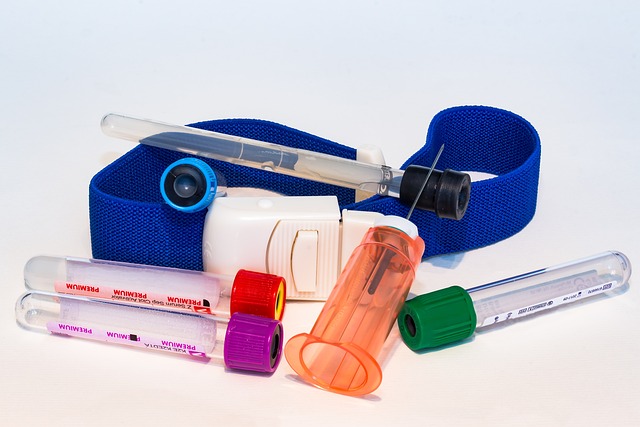The UK Advanced Thyroid Blood Test is a key diagnostic tool for identifying iron deficiency, measuring critical markers like TSH, T3, and T4, and providing insights into thyroid health and nutrient status. Ferritin levels, crucial for storing and regulating iron, should fall within 20-150 μg/L; significantly low levels indicate deficiency, which can lead to anaemia and other issues. Management includes dietary changes for mild cases or medical intervention like oral/intravenous iron therapy for severe deficiencies, with regular follow-up tests to monitor progress.
“Iron deficiency, a common nutritional deficit, can significantly impact overall health. This is where ferritin level testing becomes crucial. Ferritin, a protein that stores iron, serves as a vital indicator of iron status. In this article, we explore the significance of understanding ferritin and its role in diagnosing iron deficiency. Furthermore, we delve into how UK Advanced Thyroid Blood Tests provide advanced insights, enabling precise interpretation of ferritin levels and guiding tailored next steps for optimal health management.”
- Understanding Ferritin and Iron Deficiency
- The Role of UK Advanced Thyroid Blood Tests
- Interpreting Results and Next Steps
Understanding Ferritin and Iron Deficiency
Ferritin is a protein that plays a vital role in storing and regulating iron levels in the body. It acts as a reserve, releasing iron as needed to meet physiological demands. A UK Advanced Thyroid Blood Test may include ferritin measurement to assess iron status, particularly in cases of suspected deficiency. Iron deficiency occurs when the body doesn’t have enough iron, leading to reduced production of haemoglobin, the protein in red blood cells that carries oxygen. This can result in anaemia and various health issues, especially if left untreated.
Understanding ferritin levels is crucial in diagnosing and managing iron deficiency. Normal ferritin ranges vary based on age, sex, and overall health. Low ferritin levels indicate insufficient iron storage, often pointing towards deficiency. In the context of a comprehensive thyroid blood test, abnormal ferritin results can offer valuable insights into an individual’s nutritional status and guide appropriate interventions to address potential iron-related disorders.
The Role of UK Advanced Thyroid Blood Tests
In diagnosing iron deficiency, UK Advanced Thyroid Blood Tests play a pivotal role by offering comprehensive insights into a patient’s thyroid health and overall nutrient status. These advanced tests go beyond basic ferritin levels to measure key markers like TSH (Thyroid Stimulating Hormone), T3, and T4. This comprehensive approach is crucial as iron deficiency can often co-exist with thyroid disorders, where the body may struggle to absorb and utilize iron effectively.
By analyzing these hormones, healthcare professionals can uncover underlying thyroid imbalances that might be contributing to iron deficiency or vice versa. For instance, an elevated TSH level could indicate hypothyroidism, which may hinder iron absorption. Conversely, abnormal T3 and T4 levels might suggest hyperthyroidism, where the body’s metabolism is accelerated, potentially leading to increased iron loss. Thus, these advanced thyroid blood tests serve as a vital tool in accurately diagnosing and addressing iron deficiency, ensuring tailored treatment strategies for optimal patient outcomes.
Interpreting Results and Next Steps
Interpreting your ferritin level results is key to understanding your iron deficiency status. A normal ferritin range typically lies between 20-150 micrograms per litre (μg/L). If your result falls below 20 μg/L, it strongly suggests iron deficiency and further investigation is recommended. This could involve a UK Advanced Thyroid Blood Test to rule out other underlying causes of low ferritin levels, such as thyroid disorders or chronic inflammation.
The next steps depend on the severity of your iron deficiency. Mild deficiencies might be managed through dietary changes, focusing on foods rich in iron and vitamin C for better absorption. More severe cases may require medical intervention, including oral iron supplements or, in some instances, parenteral (intravenous) iron therapy under professional supervision. Regular follow-up tests are essential to monitor your ferritin levels and assess the effectiveness of any treatment commenced.
Ferritin level testing plays a pivotal role in diagnosing iron deficiency, especially when coupled with UK Advanced Thyroid Blood Tests. By understanding ferritin’s function and its correlation with iron stores, healthcare professionals can interpret test results to identify and manage deficiencies effectively. The next steps often involve dietary adjustments, supplementation, or further investigations, ensuring optimal health through informed care.
